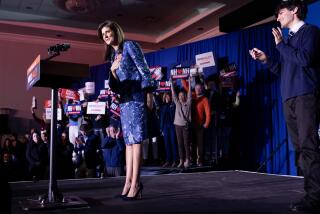The Question Is Clear: Which Way America? : Primary result challenges the President--and Democrats
- Share via
If the American voters are to have anything to say about the process of electing a president this year--and if the New Hampshire primary in any proportion reflects the overall national distress--they mean to make whoever is elected come November earn it. For Republican George Bush, this means there will be no coronation. For the Democrats this means that knee-jerk appeals to the past won’t cut it. The country may be in for one of the most interesting presidential elections in a long time.
PRESIDENTIAL DEFICIENCY: They didn’t vote in such big numbers for combative Patrick J. Buchanan because he seems so very presidential. They wanted to get Bush’s attention, get him to pay more attention to America and to forget, for a moment at least, glamorous foreign capitals, cozy chitchats with other numero unos and grandiose summits about some fuzzy new world order.
They wanted to beam Bush back down to Earth--down to the grimy details of coping with domestic problems, reviving the comatose economy and worrying about Americans. In effect they want him to earn the other half of that presidential paycheck: the domestic half.
The Democratic reasoning seems equally clear. After all, who voted for Paul Tsongas because of his charisma? And who voted for Gov. Bill Clinton because of his reputation for absolute marital fidelity? No, both Tsongas and Clinton--questions of personality and character aside--appeared to offer broad, thoughtful, plausible economic and domestic approaches. By contrast Sen. Bob Kerrey came across as a one-note candidate (health care); Sen. Tom Harkin sounds as if he’s reliving the glory days of “traditional” Democrats like Hubert H. Humphrey. And former California Gov. Edmund G. (Jerry) Brown Jr. just plain failed the plausibility test. At the finish the two most centrist candidates were at the top; the two most liberal Democrats at the bottom. Anyone get the message?
These outcomes matched the findings of The Times’ New Hampshire exit poll. Tax cut --who needs it? Only a small minority of voters, Republican as well as Democrat, would use defense savings for a tax cut. They would rather use it to reduce the deficit or increase domestic spending. Makes sense to us. And foreign policy --who needs it? Seventy-one percent of Democrats called America’s posture in the world arena “overextended.” Even Republicans--57% of them anyway--agreed with that.
It could be that President Bush will have a harder time overcoming his reputation for disinterest in domestic policy than Clinton will have with the character and patriotism issues. The Arkansas Democrat survived those two major negative questions in the final weeks of the primary campaign and finished a strong, surging second to Tsongas of Massachusetts, a former U.S. senator. He is back in the race and he is organized better than any other Democrat. Upcoming Southern primaries may put the patriotism issue to its sternest test. But Clinton has at least lived to fight another day.
PRESIDENTIAL ADVANTAGE: Bush, of course, has one thing going for him that no one else has. It’s that no one can say he isn’t presidential. He has the job--it’s his to lose.
The problem is that the job definition is broader than his apparent vision of it and he is now required to repair this serious deficiency at a time when the economy is very troubled. No fair-minded voter expects easy answers to U.S. domestic troubles. But the effort must be made to find the way out of the woods. California’s unemployment rate--at 8.1%--is higher than New Hampshire’s. The problems of U.S. competitiveness, public education deterioration, infrastructure erosion--by now everyone is familiar with the long, dreary list--are national problems, not simply the problems of one state. These problems are on any president’s chore list. Voters want someone who will try to get these chores done.
More to Read
Get the L.A. Times Politics newsletter
Deeply reported insights into legislation, politics and policy from Sacramento, Washington and beyond. In your inbox twice per week.
You may occasionally receive promotional content from the Los Angeles Times.










